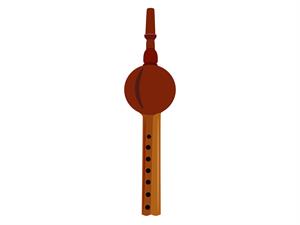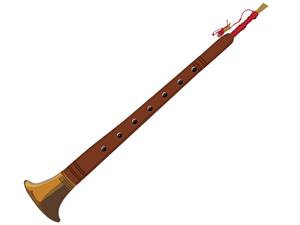PDF chapter test TRY NOW
EMPEROR Aurangzeb banned the playing of a musical instrument called pungi in the royal residence for it had a shrill unpleasant sound. Pungi became the generic name for reeded noisemakers. Few had thought that it would one day be revived. A barber of a family of professional musicians, who had access to the royal palace, decided to improve the tonal quality of the pungi. He chose a pipe with a natural hollow stem that was longer and broader than the pungi, and made seven holes on the body of the pipe. When he played on it, closing and opening some of these holes, soft and melodious sounds were produced. He played the instrument before royalty and everyone was impressed. The instrument so different from the pungi had to be given a new name. As the story goes, since it was first played in the Shah’s chambers and was played by a nai (barber), the instrument was named the ‘shehnai’.
Explanation:
Aurangzeb was a Mughal emperor who ruled India during the \(16th\) century. He had officially prohibited the musical instrument called "pungi" in his palace. He felt the pungi instrument had a piercing, sharp, unpleasant sound and it became the common name for all wind instruments which had reeds. (A reed is a thin strip of material that vibrates to produce a sound in a musical instrument). There was a barber who hailed from a family of professional musicians. This barber had access to the palace, and he decided to improve the quality of sound from the pungi.

The instrument "Pungi".
He took a pipe with a more hollow stem which was longer and broader than the existing pungi. He made seven holes on the body of the instrument. He opened and closed some of the holes while playing it. The shrill noise was transformed into soft and melodious tunes. He impressed everyone with this new sound. The transformed new instrument could not be called with the same name "pungi" anymore. A new name had to be coined for the same. It is believed that it was named "Shehnai" - because it was first played in the "Shah's" chambers by a nai (barber in Hindi).

The instrument "Shehnai".
Meanings of difficult words:
| No. | Word | Meaning |
1 | banned | officially prohibited |
2 | shrill | piercing sharp sound |
3 | reed | a thin strip of material that vibrates to produce a sound in a musical instrument |
Reference:
National Council of Educational Research and Training (2006). Beehive. The Shehnai of Bismillah Khan (pp. 21-29). Published at the Publication Division by the Secretary, National Council of Educational Research and Training, Sri Aurobindo Marg, New Delhi.
